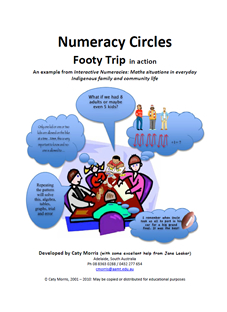Home > Indigenous Learners > Resources > Activities > Numeracy Circles: Footy Trip in action
Numeracy Circles: Footy Trip in action
Numeracy Circles: Footy Trip in action are a set of activities by Caty Morris.
This unit of work is designed for educators working with Indigenous learners but is certainly relevant for all learners from primary and middle years through to TAFE students as the learning can be extended or modified to suit age and diversity. I t takes one of the rich, mathematical problem solving tasks from the Interactive Numeracies: maths situations in everyday Indigenous family and community life resource and outlines some teaching ideas based on the Numeracy Circles process.
This unit supports sound pedagogical practice, that is, teaching for effective learning - a pedagogical approach to develop expert learners and to personalise learning. I t supports recen research and initiatives in mathematics education such as Principles and Standards for School Mathematics (National Council of Teacher of Mathematics, 2000) where traditional classrooms are replaced with learners talking to each other and groups of students voicing their opinions.
Briefly, this resource introduces a situation within a context - the situation being a problem-solving task wrapped in a context common to Indigenous family and community life - and decontextualises then recontextualises it. I t teaches the strategies and conventions of mathematics but immerses them in contexts that provide meaning.
The Numeracy Circles process provides a framework for students to be presented with a problem to solve within a familiar context and, by playing different roles, students are involved in digging out and thinking about the mathematics and numeracies in different ways. With their new learning they are encouraged to consider new contexts for applying the newly learned mathematics.
Interactive Numeracies allows learners to intuit and interpret mathematics using their own cultural tools. I t provides space for them to think about and describe mathematics using home language, and then mathematical language to re-describe it.

